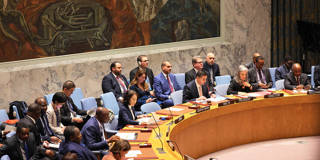The war in Ukraine has highlighted the shaky foundations of the international security order, underscoring the impotence of the body in charge of maintaining world peace. To fulfill its peacekeeping role and stop aggressors like Vladimir Putin, the Security Council should grant veto power to Germany and Japan.
TOKYO – The first anniversary of Russia’s invasion of Ukraine has been a good opportunity to reflect on the war’s global implications. In addition to untold human misery, Russia’s aggression triggered a historic food and energy crisis and caused global inflation to spike, endangering the world’s fragile economic recovery from COVID-19. But the war also highlighted the shaky foundations of the international security order that emerged after the end of World War II, sending shockwaves around the world and encouraging countries like Germany and Japan to rearm.
While some still try to justify Putin’s actions by claiming that Russia was somehow provoked by the “eastern expansion” of NATO, the fact is that Ukraine posed no threat to Russia when Putin invaded the country. Putin was not seeking to defend Russia’s territorial integrity from Ukrainian or Western encroachments; he simply wanted to pursue his imperial ambitions.
The possibility of a Russian victory in Ukraine has caused panic among Russia’s neighbors in Central and Eastern Europe, as well as governments across Central and East Asia. If Russia, a nuclear power, can invade its much-smaller neighbor and prevail, what is to stop Putin from going after Poland next, or China from invading Taiwan?

TOKYO – The first anniversary of Russia’s invasion of Ukraine has been a good opportunity to reflect on the war’s global implications. In addition to untold human misery, Russia’s aggression triggered a historic food and energy crisis and caused global inflation to spike, endangering the world’s fragile economic recovery from COVID-19. But the war also highlighted the shaky foundations of the international security order that emerged after the end of World War II, sending shockwaves around the world and encouraging countries like Germany and Japan to rearm.
While some still try to justify Putin’s actions by claiming that Russia was somehow provoked by the “eastern expansion” of NATO, the fact is that Ukraine posed no threat to Russia when Putin invaded the country. Putin was not seeking to defend Russia’s territorial integrity from Ukrainian or Western encroachments; he simply wanted to pursue his imperial ambitions.
The possibility of a Russian victory in Ukraine has caused panic among Russia’s neighbors in Central and Eastern Europe, as well as governments across Central and East Asia. If Russia, a nuclear power, can invade its much-smaller neighbor and prevail, what is to stop Putin from going after Poland next, or China from invading Taiwan?